Selecting a Stable Data Warehousing Solution
While SAP customers have a clear direction to move to ERP on cloud with S/4HANA, confusion remains on selecting a stable data warehousing solution with the choices available.
SAP provides ERP solutions with S/4HANA on-premise and S/4HANA public cloud. While the cloud version still lags behind the on-premise version in terms of functionalities, SAP has moved both solutions to the same code base, and the cloud version has quarterly releases, and new investments are being made to improve the S/4HANA public cloud functionalities.
However, the choice isn’t straightforward when selecting a stable data warehousing solution, primarily because of the number of products available in the market and existing investments in legacy data warehouses.
Let’s look at SAP’s offerings in data warehousing and SAP’s strategy and roadmap to enable the decision of selecting a stable data warehousing solution.
SAP Offerings in Data Warehousing
SAP currently has several data warehousing solution offerings available, as below:
- On-premise and Private Cloud solution: SAP BW/4HANA is a mature and stable data warehousing product, available as on-premise and private cloud edition solution offerings. Customers who have migrated onto SAP BW/4HANA can safeguard investments and continue with the product, as SAP support is planned until at least 2040.
- Public Cloud Solution: SAP Data Warehouse Cloud (SAP DWC) provides a clear direction of data warehousing solution to the public cloud. It opens up many of opportunities with integration options available to any SAP and non-SAP sources and reporting with SAP Analytics Cloud components.
- Hybrid: As SAP DWC is a gradually maturing product, SAP offers a hybrid solution option where customers can innovate in DWC, gradually extend their current investments in BW or BW/4HANA, and share/transfer data models back into DWC.
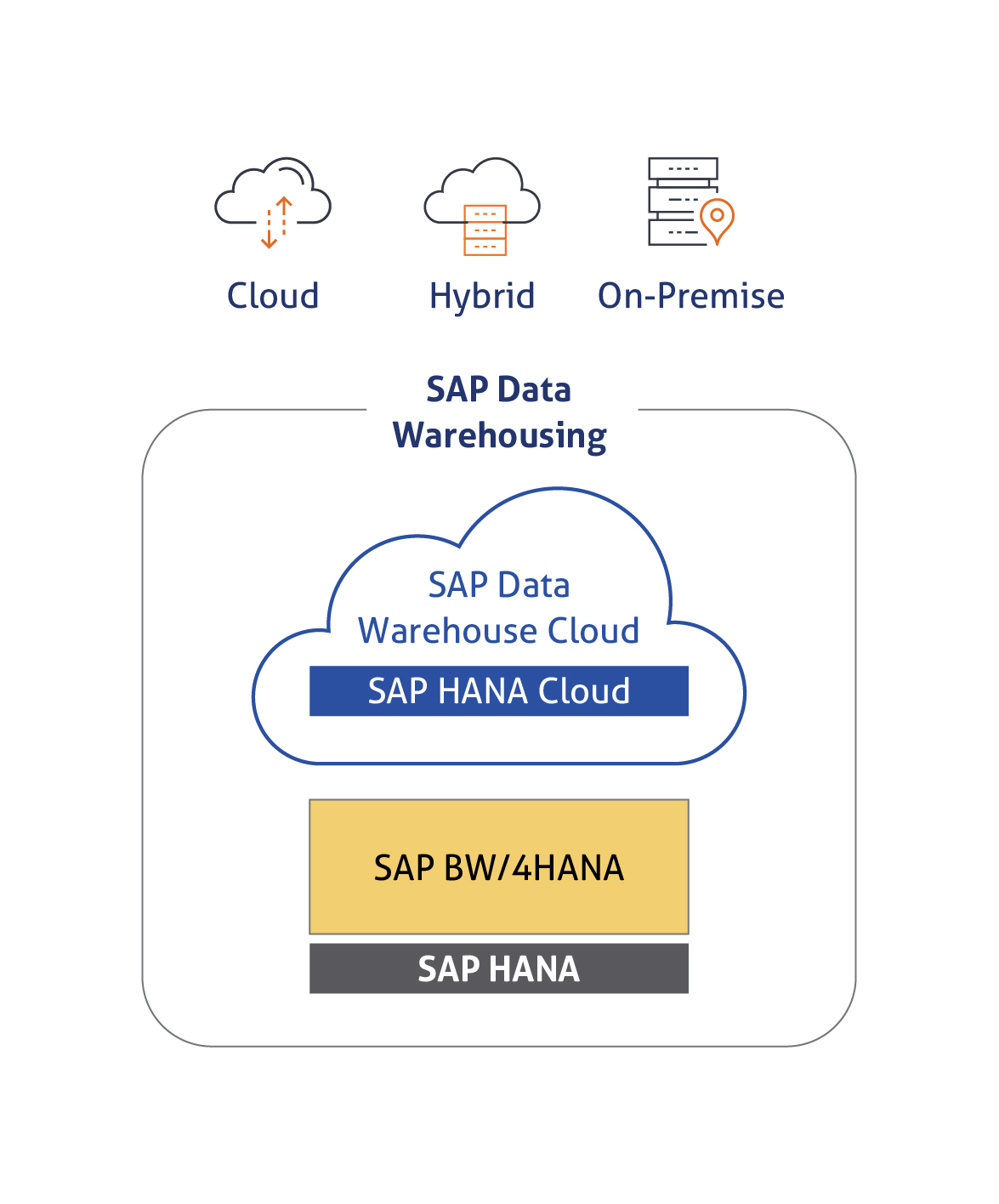
Image source: SAP
Characteristics of SAP Data Warehouse Cloud
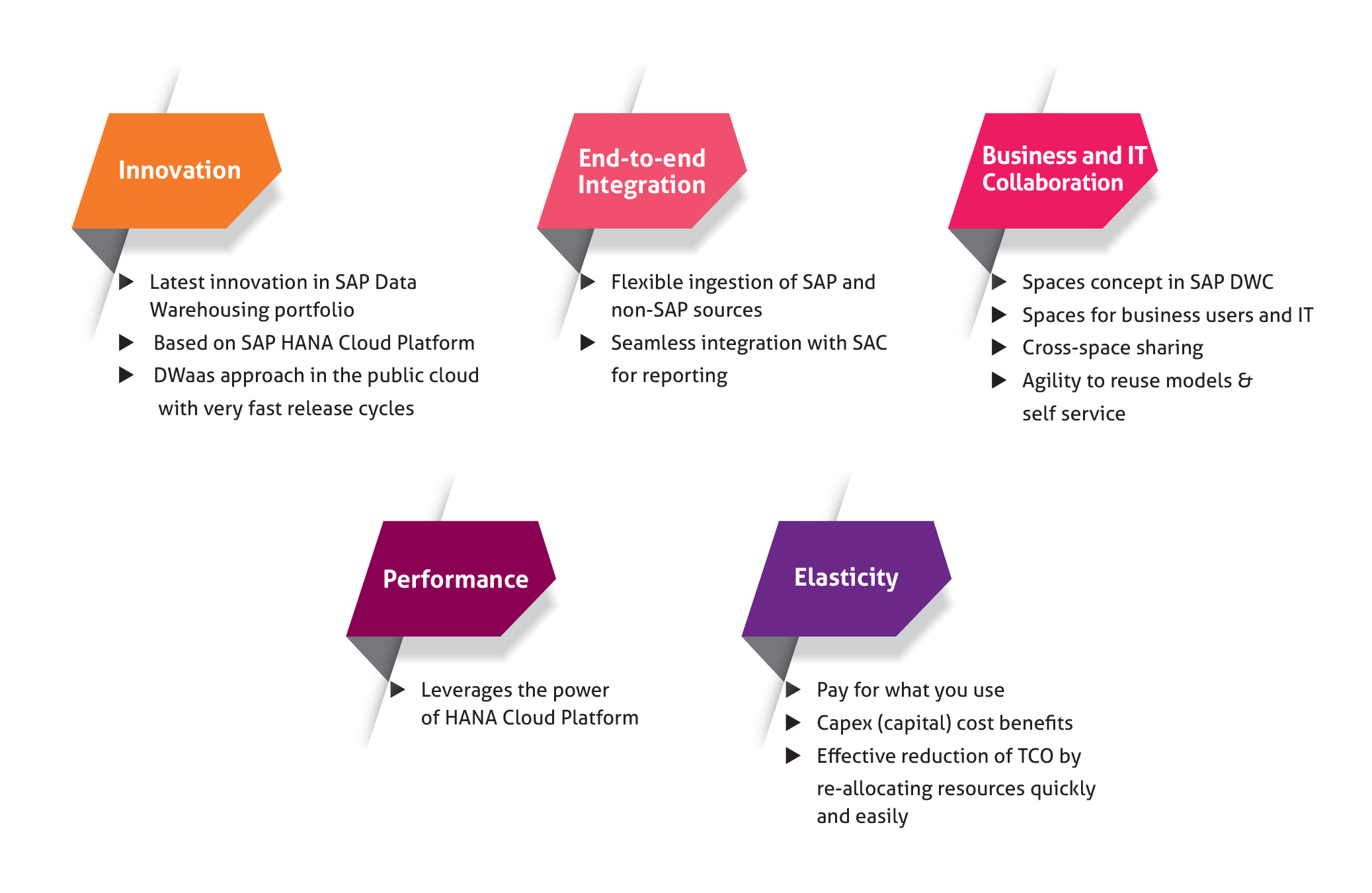
The key characteristics of SAP Data Warehouse Cloud are as follows:
- Innovation: DWC is the latest innovation in the SAP Data Warehousing portfolio, and SAP will continue to direct investments in rolling out new features and functionalities on this product.
- Business and IT Collaboration: DWC offers platform collaboration between business and enterprise IT, which provides agility to business users for flexible modeling and self-service reporting.
- End-to-end Integration: DWC is able to integrate data from any source and provides seamless integration with SAP Analytics Cloud components for reporting.
- Performance: As DWC is based on SAP HANA Cloud Platform, it leverages the power of SAP HANA.
- Elasticity: As DWC is on public cloud, it offers customers the openness to pay per use, which reduces the TCO and increases the flexibility to reallocate resources quickly and easily across different use cases and lines of business.
Enabling the transition to SAP Data Warehouse Cloud – BW Bridge
SAP proposes a clear strategy to move to SAP Data Warehouse Cloud via BW Bridge for customers with an existing BW system. SAP BW Bridge is a functional extension of the SAP DWC. A majority of the functions of a SAP BW system can be found within the BW Bridge. Check the SAP Road Map Explorer for the planned upcoming rollout of new supported features in DWC and BW Bridge.
SAP provides tool-supported conversion, including data flows from the existing BW system to the BW Bridge.
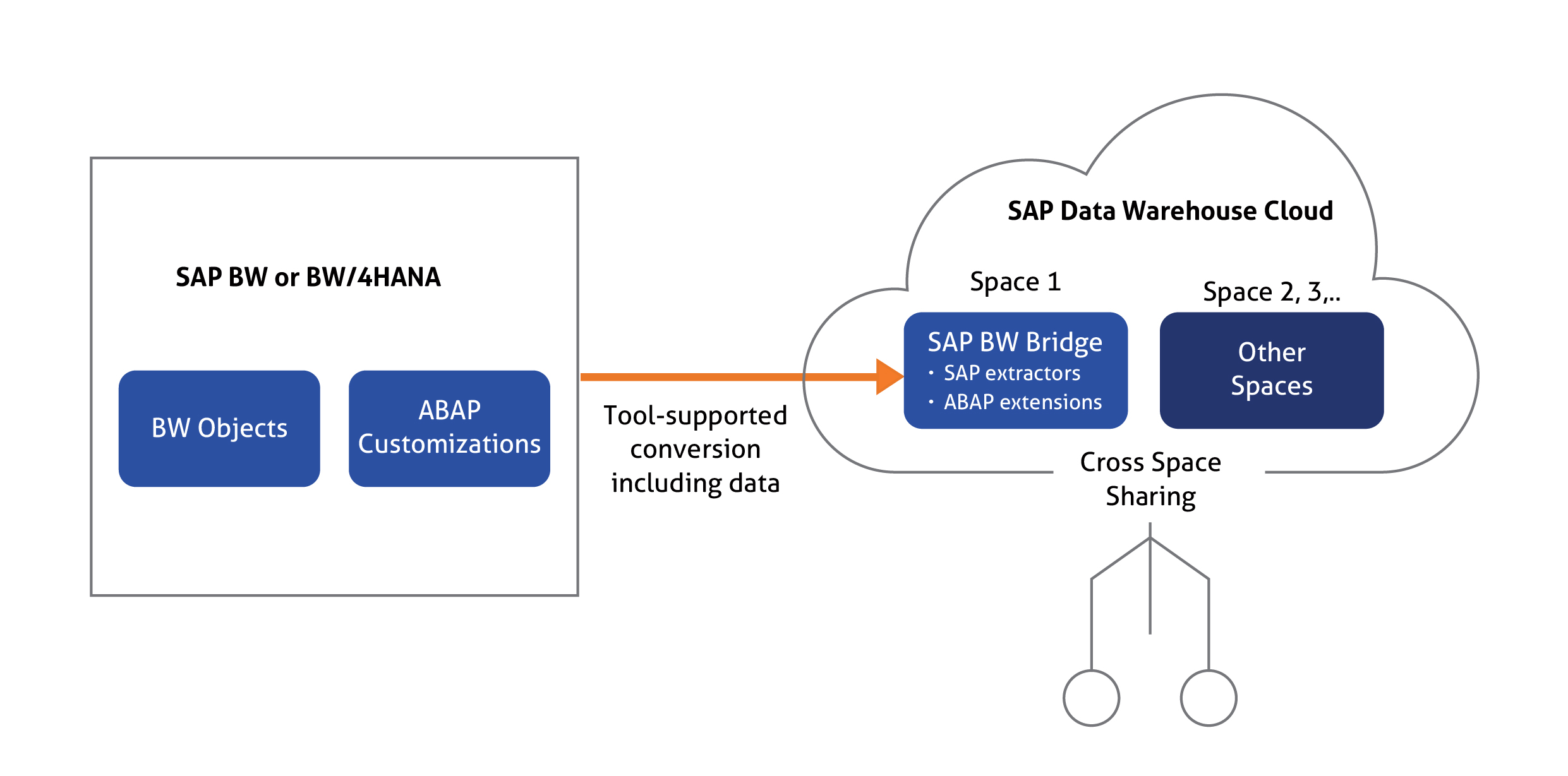
Image source: SAP
SAP BW Bridge safeguards existing investments in a BW or BW/4HANA system. A ‘Space’ is created and dedicated to SAP BW Bridge within the DWC tenant, and existing BW objects (Info objects, Advanced DSOs, Composite providers) and ABAP customizations from an existing BW system can be migrated onto SAP BW Bridge space on DWC. This offers the capability to convert BW objects into DWC artifacts (remote tables) within another space and make them ready for consumption into DWC data models and business entities.
The below diagram depicts the potential target architecture of SAP BW Bridge:
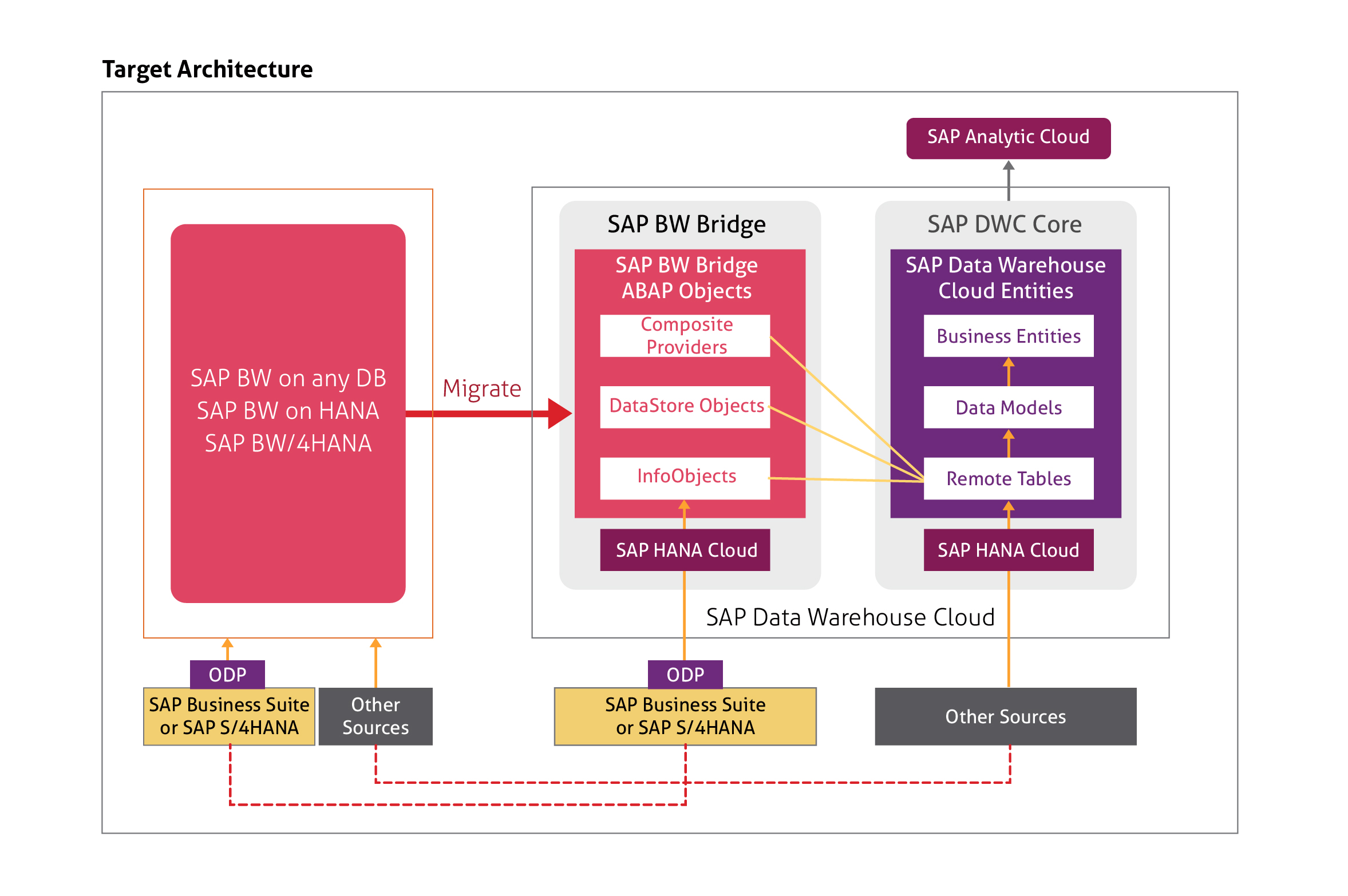
Image source: SAP
Points of Recommendation
At LTIMindtree, we help our customers find the best possible answers to implement a robust and future-proof data warehousing solution.
The below decision tree will enable customers to find answers in the journey to select the right tools for implementing a stable data warehousing solution in accordance with SAP’s roadmap and strategy.
- If a customer has already invested in SAP BW/4HANA, the recommendation will be to continue using the product, as SAP BW/4HANA support is available at least until 2040
- If a customer’s BW system is still on the BW7.x version and the sources of data are mainly SAP sources, it will be key to understand the reporting requirements before choosing the right tool. If the requirement is mainly operational reporting, it will be beneficial to utilize the benefits of S/4HANA Embedded Analytics in conjunction with SAP Analytics Cloud for reporting, provided the customer’s ERP solution is implemented on or planned to move to S/4HANA. If there are analytical or strategic reporting requirements, it will be recommended to consider migrating the existing BW system either to BW/4HANA or moving to DWC on the public cloud, depending on the complexity of the requirements.
An assessment exercise will need to be done prior to the migration to determine the complexity of the requirements and select the right data-warehousing tool as per the product’s feasibility analysis and define the conversion approach (In-place/Remote/Shell). LTIMindtree Analytics team provides support in performing the assessment and helps customers in that journey.
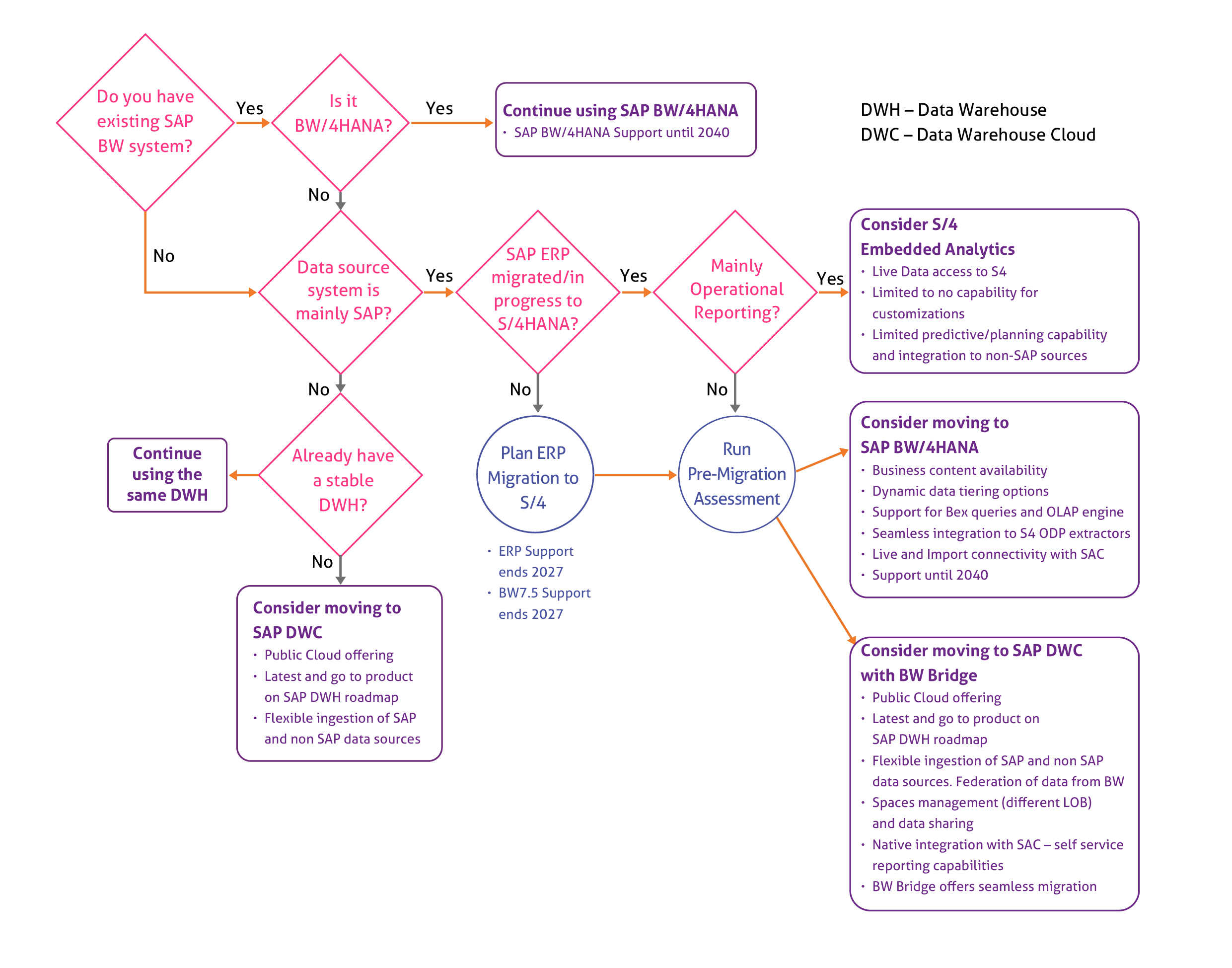
Conclusion
As we move into a new era where managing the huge pipeline of data from social media and other platforms into a centralized data warehouse poses a potential challenge, SAP Data Warehouse Cloud aims to solve that problem and will be a key differentiator for businesses to thrive. It opens up a new range of opportunities to customers who have already invested in SAP technologies and solutions, safeguards investments with BW Bridge functionality, provides a new form of openness, and unlocks innovation with business and enterprise IT collaboration.
Watch this space for a subsequent series of blogs as we continue to take you through the journey of SAP DWC.
Latest Blogs
Introduction What if training powerful AI models didn’t have to be slow, expensive, or data-hungry?…
Pharmaceutical marketing has evolved significantly with digital platforms, but strict regulations…
Leveraging the right cloud technology with appropriate strategies can lead to significant cost…
Introduction The financial industry drives the global economy, but its exposure to risks has…




